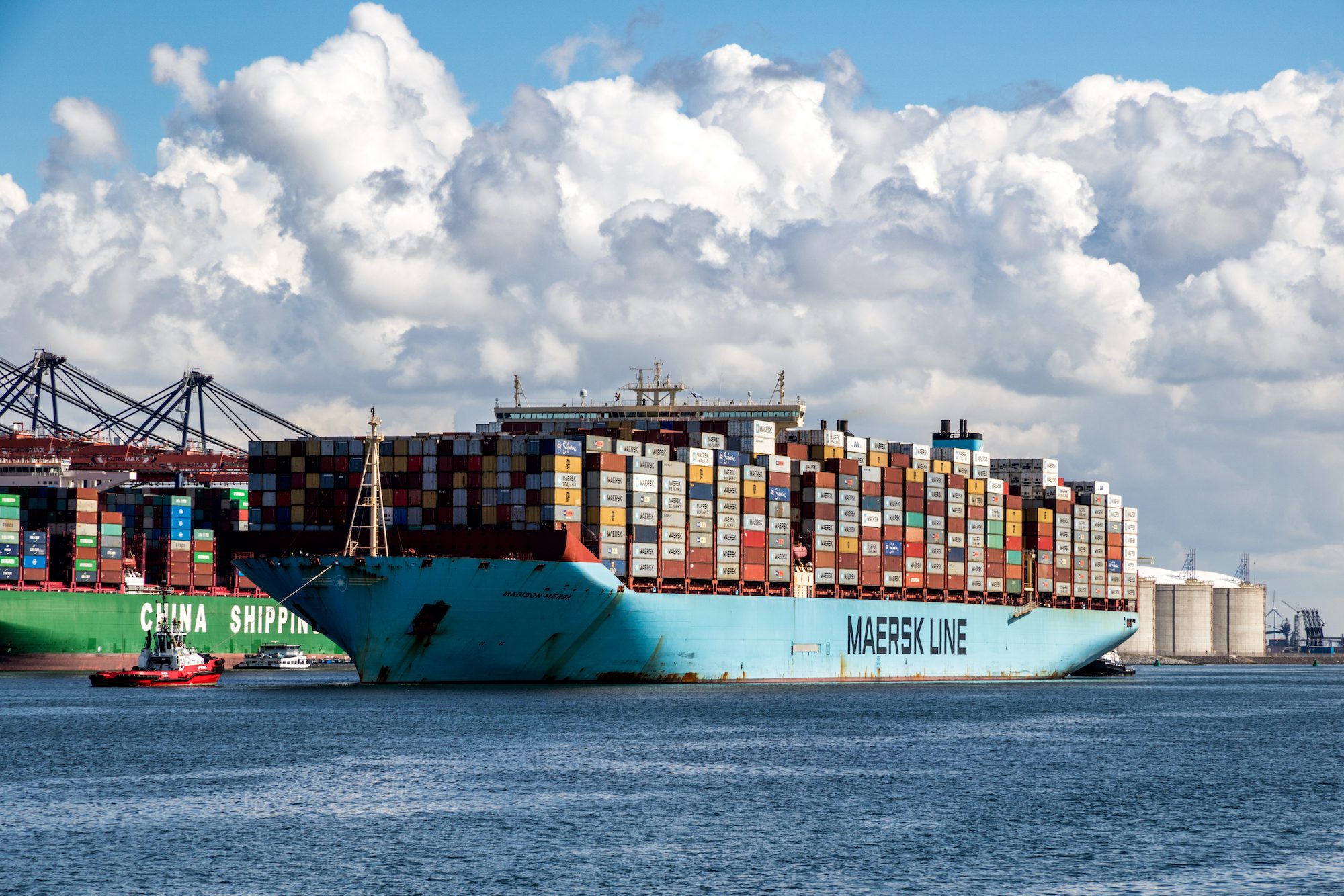UK Strikes at Heart of Russia’s Arctic Energy Empire
New maritime services ban threatens to sever lifeline for Yamal LNG exports By Paul Morgan (gCaptain) – In the frozen waters above the Arctic Circle, a fleet of specialised ships...

Maersk ship entering the Port of Rotterdam. Photo: Shutterstock
Copenhagen-based shipping giant A.P. Moller – Maersk has refined its full-year 2025 financial guidance, raising the lower end of its earnings projections following a strong third quarter that saw sequential growth across all business segments.
The Danish logistics company now expects underlying EBITDA of $9.0-9.5 billion for the full year, up from the previous range of $8.0-9.5 billion established in August. The underlying EBIT guidance has also been adjusted to $3.0-3.5 billion, compared to the earlier $2.0-3.5 billion range. Notably, while Maersk raised the floor of its guidance, the upper end remains unchanged.
The company also revised its outlook for global container market volume growth upward to around 4%, compared to its previous estimate of 2% to 4%.
Q3 Performance Beats Expectations
Maersk reported third-quarter revenue of $14.2 billion, with EBITDA of $2.7 billion and EBIT of $1.3 billion. While these figures represent a year-over-year decline from Q3 2024’s exceptional results of $4.8 billion EBITDA and $3.3 billion EBIT, they demonstrated solid sequential improvement across the portfolio.
“We have delivered a strong third quarter across our business. Our performance reflects our ability to execute and continuously improve, as well as the trust customers place in us,” commented Vincent Clerc, CEO at Maersk. “The new East-West network has strengthened our Ocean performance, delivering industry-leading reliability, higher volumes and lower costs.”
Segment Highlights
The Ocean segment posted EBIT of $567 million, up significantly from $229 million in the previous quarter, driven by implementation of its Gemini Cooperation with Hapag-Lloyd, which enabled substantial cost savings and supported 7% loaded volume growth year-over-year.
The Gemini Cooperation, which targets 90% schedule reliability, represents a next-generation vessel sharing operation designed to build what the companies call “the industry’s most reliable, airline-style scheduled network.”
Terminals achieved record performance with EBIT of $571 million, up from $461 million quarter-over-quarter, as volumes grew 8.7% driven by strong demand across Americas, Europe, and Africa. Terminal utilization reached 89%, with some facilities approaching full capacity.
Logistics & Services continued its profitability trajectory, improving margins to 5.5% from 4.8% in the previous quarter, with EBIT climbing to $218 million from $175 million. The improvement was driven by cost control and strong performance in Fulfilled by Maersk, particularly in warehousing operations.
Red Sea Disruption Persists
Maersk expects the Red Sea disruption to continue for the full year, forcing continued rerouting of vessels around the Cape of Good Hope and adding both time and cost to supply chains.
During the quarter, Maersk distributed $578 million to shareholders entirely through share buybacks. The company also refined its capital expenditure guidance, now expecting approximately $10 billion for 2024-2025, down slightly from the previous $10-11 billion range.
Industry Faces Mixed Signals
Maersk’s somewhat optimistic guidance update contrasts with more cautious outlooks from some competitors. Ocean Network Express recently forecast a full-year profit of just $310 million for its fiscal 2025, implying an expected $61 million loss in the second half (October 2025 to March 2026), following first-half profits of $371 million.
“We maintain a cautious outlook for the full year given current market dynamics,” said ONE CEO Jeremy Nixon, citing geopolitical uncertainties and market fluctuations driven by tariff concerns.
The container shipping sector has navigated a challenging environment marked by oversupply from new vessel deliveries, tariff uncertainties, and ongoing Red Sea rerouting that forces vessels around the Cape of Good Hope.
Maersk, however, appears confident in its ability to maintain stability. “As market conditions fluctuate, we are well positioned to help our customers adapt and maintain stability across their supply chains,” Clerc said.

Sign up for gCaptain’s newsletter and never miss an update

Subscribe to gCaptain Daily and stay informed with the latest global maritime and offshore news
Essential news coupled with the finest maritime content sourced from across the globe.
Sign Up